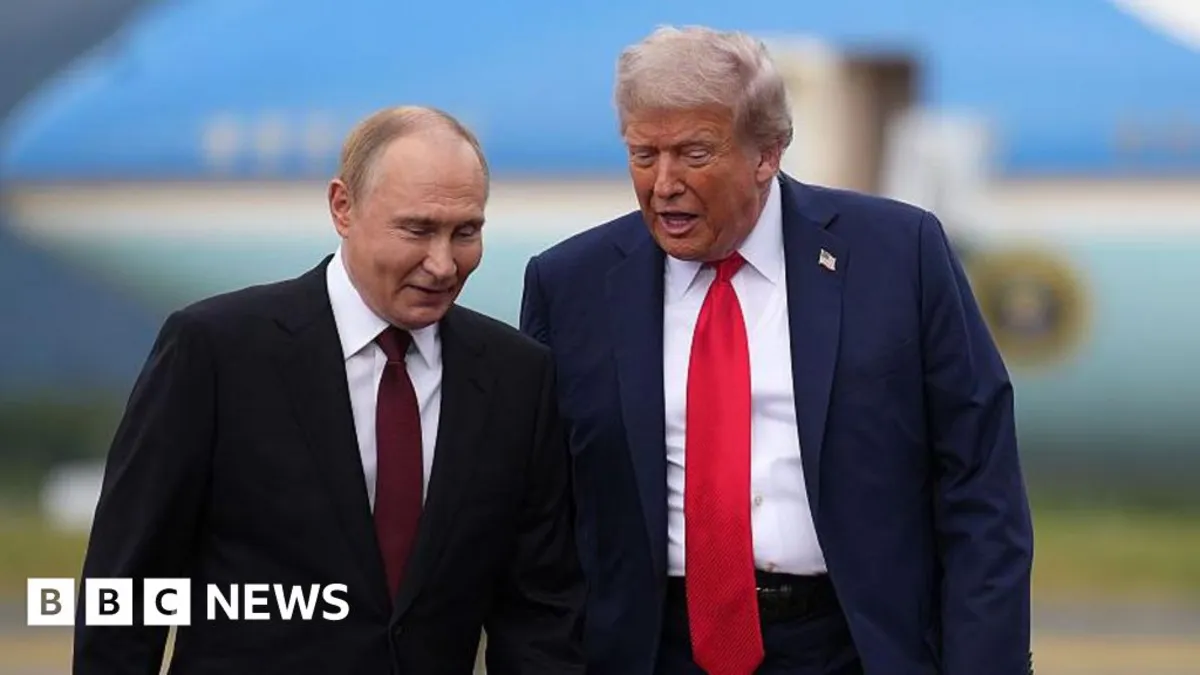
In recent developments, the Kremlin has sought to diminish speculation regarding an imminent summit between Russian President Vladimir Putin and Ukrainian President Volodymyr Zelensky. This comes as former US President Donald Trump has reiterated his call for the two leaders to engage in direct discussions aimed at ending the ongoing war in Ukraine.
The call for a bilateral meeting follows Trump's recent meeting with Putin in Alaska and his discussions with seven European leaders and Zelensky at the White House on Monday. Trump acknowledged the complexity of the conflict, admitting it may be challenging to bring about a resolution, especially if Putin is not genuinely interested in ceasing hostilities. "We're going to find out about President Putin in the next couple of weeks," Trump stated, suggesting the possibility that the Russian leader may not be inclined to negotiate. He emphasized that if this were true, Putin would face a difficult situation, although he did not provide further details.
During a conversation with Trump, Putin expressed his openness to the idea of direct talks with Ukraine. However, the following day, Russian Foreign Minister Sergei Lavrov tempered this commitment, stating that any potential meeting would need to be "prepared gradually," starting from an expert level. This statement echoed a common theme in Kremlin rhetoric, highlighting the cautious approach the Russian government is taking towards negotiations.
Dmitry Polyanskiy, a Russian deputy representative to the UN, remarked that while there has been no rejection of direct talks, the meeting should not occur merely for its own sake. Trump reported that Putin had proposed the idea of Zelensky traveling to Moscow for discussions, a suggestion that Ukraine is unlikely to accept. This proposal may serve as a tactic by Russia to present an unattainable option, effectively sidelining any real negotiations.
Trump's recent interactions seem to have provided him with a clearer understanding of the intricacies surrounding the war in Ukraine and the significant disparity between Moscow's demands and Kyiv’s position. The much-anticipated ceasefire that Trump hoped to negotiate with Putin has not materialized. Instead, he has pivoted his focus toward urging both Ukraine and Russia to pursue a permanent peace deal. Notably, discussions have made some progress regarding security guarantees essential for Ukraine’s sovereignty in any future agreement.
On Tuesday, Trump indicated the US's willingness to assist European allies by providing air support in the event that they commit ground troops to Ukraine during a ceasefire or peace deal. However, he clarified that the deployment of US troops is not on the table. The specifics of what this air support might entail—whether it includes intelligence assistance or the use of fighter jets—remain unclear.
While Trump’s commitments remain somewhat ambiguous, the France and UK-led Coalition of the Willing has been actively working to finalize plans for a reassurance force that could be deployed to Ukraine should hostilities come to an end. Following a virtual meeting on Tuesday, a spokesperson from Downing Street announced that the group would be meeting with US counterparts in the coming days to strengthen plans for robust security guarantees.
After his recent summit with Putin and subsequent discussions with Zelensky, Trump appears to believe that direct negotiations between Ukraine and Russia could potentially lead to a peace agreement. However, he acknowledged the significant animosity that exists between the two leaders, noting that their last encounter was in 2019. Since then, the conflict has escalated, resulting in tens of thousands of casualties and extensive destruction, alongside ongoing aerial assaults on civilian infrastructure.
Putin views Zelensky as an illegitimate leader, blaming him for Ukraine's increasing alignment with the West. For years, he has perpetuated unfounded claims of Kyiv being governed by a neo-Nazi regime, insisting that any ceasefire would necessitate a change in Ukraine's leadership. Additionally, Russia has shown little interest in negotiating while its military maintains an advantage on the battlefield.
Despite these challenges, European leaders and Zelensky have expressed support for the possibility of a bilateral meeting. Zelensky stated on Monday that he is open to any format of meeting with Putin. Meanwhile, European leaders are exploring potential summit locations, hoping that their enthusiasm for direct talks may persuade Trump to adopt a firmer stance against Moscow if Putin remains resistant to making progress toward ending the war.